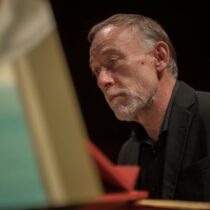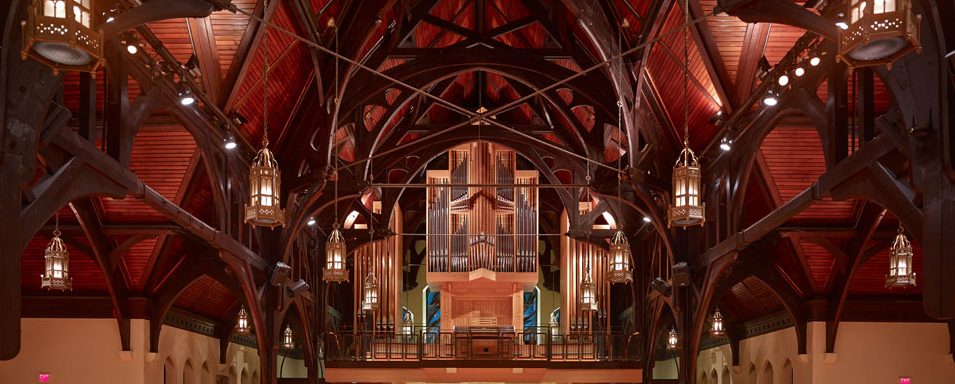Christ Church Cathedral | Map
Alexander Weimann, organ
Clavier-Übung is the German word for “keyboard practice”. In late 17th and early 18th centuries this was a common title for keyboard music collections, although today it is usually associated with J.S. Bach’s comprehensive and jaw-dropping achievement in four parts. The Clavier-Übung III, is the third part of J.S. Bach’s collection and is often referred to as the German Organ Mass. It is a collection of compositions for organ started in 1735–36 and published in 1739 that is considered Bach’s most significant and extensive work for organ, containing some of his most musically complex and technically demanding compositions for that instrument. For the first organ recital ever programme as part of the Vancouver Bach Festival, Vancouver’s organ virtuoso Alexander Weimann plays excerpts from this collection including the Prelude and Fugue in Eb major, BWV 552.
To view/download this programme, please click here.
Programme
Johann Sebastian Bach (1685-1750):
from Clavier-Übung III
Prelude
Præludium (pro Organo pleno) BWV 552/1
Kyrie
Kyrie! Gott Vater in Ewigkeit (Canto fermo in Soprano à 2 Clav. et Ped.) BWV 669
Christe, aller Welt Trost (Canto fermo in Tenore à 2 Clav. et Ped.) BWV 670
Kyrie! Gott heiliger Geist (à 5, Canto fermo in Basso Cum Organo pleno) BWV 671
Gloria
Allein Gott in der Höh’ sei Ehr’ (à 3, Canto fermo in Alto) BWV 676
Credo
Wir glauben all’ an einen Gott (in Organo pleno con Pedale) BWV 680
Agnus Dei
Improvisation on “Dona nobis pacem”
Postlude
Fuga (à 5, con pedale, pro Organo pleno) BWV 552/2
Programme Notes
Johann Sebastian Bach gave the name “Clavier-Übung” (Keyboard Practice) to the volumes of his most extensive publication venture. Clavier-Übung I (1731) contains six harpsichord partitas, Clavier-Übung II (1735) the Italian Concerto and French Overture for harpsichord, Clavier-Übung IV (1741) the Goldberg Variations. Clavier-Übung III (1739), the focus of today’s concert, is devoted to typical central-German organ repertoire. It has sometimes been called “Bach’s Organ Mass”, linking it to a tradition of liturgical publications by master organists like Girolamo Frescobaldi and Nicholas de Grigny, whose music Bach had collected for his personal library. Bach explained something about this collection’s function on its title page:
Third Part of the Keyboard Practice, consisting of various preludes on the Catechism and other hymns for the organ. Prepared for music-lovers and particularly for connoisseurs of such work, for the recreation of the spirit, by Johann Sebastian Bach, Royal Polish and Electoral Saxon Court Composer, Capellmeister and director of the chorus musicus, Leipzig. Published by the Author.
Clavier-Übung III was indeed met with excitement by certain colleagues; Johann Elias Bach, J.S. Bach’s pupil and private secretary, anticipated it’s release, exclaiming, “It happens that my honoured Cousin will bring out some clavier pieces that are mostly for organists and exceedingly well composed, and they will doubtless be ready for the coming Easter [Book] Fair and make some 80 folios [of printed music]!” Johann Christoph Mizler, esteemed physician, historian, mathematician, and composer, declared in his review of the publication that “the author has here given proof that in this field of composition, he is more skilled and more successful than many others. No one will surpass him in it, and few will be able to imitate him.” Not only would few people have had the ability to imitate the compositional prowess demonstrated in Clavier-Übung III, but few organists other than Bach’s own students would have possessed the technical ability to play much of the music in it. These are not the sort of keyboard exercises that might assist an amateur player unable to improvise his own chorale preludes or develop a young student’s technique. Why might Bach have gone to the trouble and personal expense of making this music available in print, though the market for it must have been small?
One incentive may have been the announcement and celebration of Bach’s appointment as Royal Polish and Electoral Saxon Court Composer in 1736. In acknowledgement of the honour, he had performed an organ recital on the brand-new organ of the Frauenkirche in Dresden. Perhaps it included some of the music in the Clavier-Übung III. Bach was highly renowned as an organist and especially as an improviser; another organ recital given in Dresden in 1731 had drawn from reviewer Johann Gottlob Kittel a lavish poem of praise, playing on the meaning of Bach’s name – brook.
A pleasant brook may well the ear’s delight inspire,
As through the woods, between high cliffs, it finds its way;
But surely one must rank that other Bach far higher,
Who with his hurrying hand so wondrous sure doth play.
‘Tis said, when Orpheus did his lyre strings awake,
All creatures in the forest answered to the sound;
But sure, ‘twere better that such praise of Bach we spake,
Since he, when’er he plays, doth each and all astound.
The other motivation must have been this “recreation of spirit”, which Bach mentioned on the title page. But, who were the connoisseurs to whom Bach offered recreation and how would they have enjoyed the collection? We have no way of tracing the individuals who purchased a copy of Clavier-Übung III, but the word “connoisseur” emphasizes knowledge and careful attention. Much about the collection calls to mind a parallel with another source of recreation in Bach’s day – the Wunderkammer or cabinet of curiosities, a personal museum of rare and precious objects such as biological and mineral specimens and works of art and craftsmanship. Such collections aimed to astonish the viewer, create a sense of exaltation, spark reflection about the complexity of the natural world, or the culture and history that produced the artifacts. They were often a source of spiritual relief and refreshment.
The Wunderkammer of the Clavier-Übung III is full of marvels: the stile antico, Palestrina-style polyphony of the Kyrie setting, the up-to-date, elegant, galant style of the Allein Gott trio… The ancient tune of Wir glauben all’ in einen Gott had been used to sing the Credo long before the Reformation. Bach choose to use just its beginning as the contrapuntal subject of his chorale setting. It comes again and again and again, emphasizing “we believe…” and focusing attention on the centuries of Christian tradition. The setting of Vater unser in Himmelreich, the text of the Lord’s Prayer, immensely complex and multi-layered, like a labyrinth, seems to express the strain of prolonged supplication. The Prelude and Fugue remain the subject of curiosity today. Their three parts have been compared to the three Persons of the Trinity. Scholars have recognized the Golden Mean in their structure and continue to speculate about many possible examples of numerical symbolism hidden within them. Long after his death, these treasures of Bach’s artistry still fascinate, inspire, and provide rich spiritual recreation.
— Notes by Christina Hutten

Alexander Weimann, organ
Alexander Weimann is one of the most sought-after ensemble directors, soloists, and chamber music partners of his generation. After travelling the world with ensembles such as Tragicomedia, Cantus Cölln, the Freiburger Barockorchester, Gesualdo Consort and Tafelmusik, he now focuses on his activities as Music Director of the Pacific Baroque Orchestra in Vancouver, Music Director of the Seattle Baroque Orchestra, and regular guest conductor of ensembles including the Victoria Symphony, Symphony Nova Scotia, Arion Baroque Orchestra in Montreal and the Portland Baroque Orchestra.
Alex was born in Munich, where he studied the organ, church music, musicology (with a summa con laude thesis on Bach’s secco recitatives), theatre, mediæval Latin, and jazz piano, supported by a variety of federal scholarships. From 1990 to 1995, he taught music theory, improvisation, and Jazz at the Munich Musikhochschule. Since 1998, he has been giving master classes in harpsichord and historical performance practice at institutions such as Lunds University in Malmö, the Bremen Musikhochschule, the University of California (Berkeley), Dartmouth College (New Hampshire), McGill University, Université de Montréal, and Mount Allison (New Brunswick). He now teaches at the University of British Columbia and directs the Baroque Orchestra Mentorship Programme there. He has received several JUNO and GRAMMY Award nominations – most recently, for the album Nuit Blanches with the Pacific Baroque Orchestra and Karina Gauvin.


